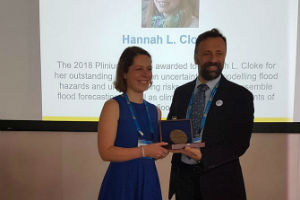Flood forecast pioneer wins European research prize
23 April 2018

A University of Reading researcher who has advised the UK government on flood risk has been awarded the 2018 Plinius Medal for her research on predicting floods now and in the future.
Professor Hannah Cloke, Director of Hydrology Research, received the prize from the European Geosciences Union (EGU) at a presentation event this month.
The prize was awarded for outstanding research on uncertainties in modelling flood hazards and understanding risks in operational ensemble flood forecasting, as well as climate impact assessments of future flood risks.
Professor Cloke said: “It is an honour to receive the Plinius Medal. The research I carry out alongside my colleagues is driven by a strong desire to really help communities better predict and prepare for flooding, so it is wonderful that it has been recognised in this way.”
Research projects
Professor Cloke is a hydrological modeller and catchment hydrologist with internationally leading publications on flood forecasting and early warning systems, flood risk management and land surface modelling.
She codirects the Natural Environment Research Council’s (NERC’s) Flooding from Intense Rainfall programme and works closely with many local, national and international partners such as the Met Office, the Environment Agency, the European Centre for Medium-range Weather Forecasts (ECMWF) and local flood groups. She is attached to the European Flood Awareness System (EFAS) and the Global Flood Awareness System (GloFAS).
Professor Cloke’s focus has been on understanding uncertainties in modelling flood hazards and risks, ranging from the small hill slope to the continental, from the meteorological forcing down to flood inundation. Her work on the quantification of uncertainty in modelling has greatly advanced our understanding of risks, both in operational ensemble flood forecasting as well as in climate impact assessment of future flood risks.
"Cloke has through her scientific excellence and her high-impact, cross-cutting research greatly contributed to the advancement of the field of natural hazards" - EGU
Together with fellow meteorologists, Professor Cloke has worked to improve the operational ensemble forecast at ECMWF. Furthermore, her collaboration with social scientists has enhanced our understanding of the decision-making process and how we better can communicate risk. Her contributions to hydrological forecasting in the UK and the operational forecasting system EFAS has helped to improve flood preparedness for people all over Europe.
Professor Cloke is currently leading two NERC funded projects: TENDERLY: Towards END-to End flood forecasting and a tool for ReaL-time catchment susceptibility, and SINATRA: Susceptibility of catchments to INTense Rainfall and flooding. In addition, she is currently participating in two Horizon 2020 projects and participating in three other NERC projects.
Government advisor
For her work, she was awarded the NERC Early Career Impact Award, and the Water Cycle project she led was selected as runner up for the Guardian Research Impact awards in 2016. Alongside the work on probabilistic flood hazard and risk, Professor Cloke has worked extensively on understanding and perception of risks. This research has put the focus on the issue of adequately communicating and disseminating forecast information.
As a seconded expert scientist to the UK government at the time of the 2014 winter floods in the UK, she has also contributed to the public understanding of flood risk frequently addressing this topic in national media. In numerous appearances she was clearly able to explain the scientific evidence basis for flood risk management practices, which also led to her receiving Reading University’s Vice-Chancellor’s Public Communications Prize in 2015.
Professor Cloke’s world-leading expertise in flood risk have resulted in her nomination to the Advisory Group for the National Flood Resilience Review in 2016.
Announcing Professor Cloke as the recipient of the 2018 Plinius Medal, the EGU described her as the ‘outstanding flood researcher of her generation’. It said: “Cloke has through her scientific excellence and her high-impact, cross-cutting research greatly contributed to the advancement of the field of natural hazards, which makes her eminently worthy of receiving the Plinius Medal.”
